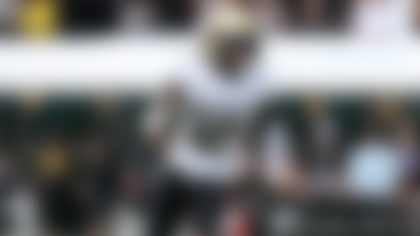ST. PAUL, Minn. -- U.S. District Court Judge Susan Nelson said Wednesday that she will take the NFL and NFL Players Association's arguments "under advisement" but that she'll need "a couple of weeks" before she issues a ruling on the players' request for an injunction to lift the league-imposed lockout.
Nelson also advised the sides after the five-hour hearing that they should resume negotiations in the setting of federal court, where she said the risks presented because of the pending National Labor Relations Board case would be eliminated.
"It seems to me both sides are at risk, and now is a good time to come back to the table," Nelson said.
Nelson said she'd be "glad to facilitate" further negotiations to settle the matter out of court and create a setting that would "protect both sides from the consequences" of what could be ahead.
"Litigation settlement discussions have been something that the Brady plaintiffs, the class counsel, have said they'd be willing to do from the beginning," NFLPA outside counsel Jeffrey Kessler said. "That's 'litigation settlement discussions,' that's what the judge is talking about, not collective bargaining, not collective bargaining mediation in Washington -- entirely different animal. That's up to the NFL. That's what she told them they should do.
"We're settling antitrust claims in a lawsuit, which could (lead) to a new system, like the Reggie White settlement did (in creating unrestricted free agency in 1993). But it's not collective bargaining."
The NFL said it prefers to return to the Federal Conciliation and Mediation Service office in Washington, D.C., where the sides went through 16 days of mediated talks before they broke down, leading to the March 11 union decertification and March 12 lockout.
"(A resolution) can happen, if we just get back to bargaining," said NFL outside counsel David Boies, who spoke before the judge for more than three hours in Wednesday's hearing. "The Federal Mediation Service, as I said before, these are the people who do it for a living, they do it in industry after industry. We ought to be taking advantage of that."
Nelson heard the cases of Brady et al v. the National Football League et al and Eller et al v. the National Football League et al, and she approved a motion to consolidate both. Hall of Famer Carl Eller, the lead plaintiff in the second case filed by retirees, former players and rookies, was present, and his group's attorney, Michael Hausfeld, took turns with NFLPA outside counsel James Quinn arguing against and rebutting Boies.
Many of the biggest names in the dispute didn't make the trip to Minnesota, with Commissioner Roger Goodell and general counsel Jeff Pash absent on the league side and named plaintiffs Tom Brady, Drew Brees and Peyton Manning not in attendance for the players.
Five of the 10 named plaintiffs in the Brady case did appear: Mike Vrabel of the Kansas City Chiefs, Ben Leber and Brian Robison of the Minnesota Vikings, Vincent Jackson of the San Diego Chargers, and Texas A&M linebacker Von Miller were joined in court by veterans Tony Richardson of the New York Jets and Charlie Batch of the Pittsburgh Steelers, members of the union's executive committee before dissolution.
NFLPA executive director DeMaurice Smith also attended the hearing, and the players, lawyers and officials arrived and departed together in a bus.
Nelson listened to arguments from lawyers for the players and the league, asking questions often and speaking politely but directly while acknowledging her difficulty discerning which components of the laws apply to this complicated case.
Nelson expressed some frustration trying to understand some of the arguments, mostly those made by Boies, but she oversaw a cordial process, telling the sides they did an "outstanding job." Both sides praised Nelson afterward for her thorough approach and intelligent questions.
As she began the hearing, Nelson urged both sides to stick to the issue of the injunction and not delve into the evidence previously presented in their briefs since all parties are up to speed on the information.
"You can assure that the court has done nothing else in the last few weeks," Nelson said.
Although the players' claim of suffering "irreparable harm" in a lockout is central to consideration in the injunction ruling, two other subjects -- the role of the NLRB and the interpretation of the Depression-era Norris-LaGuardia Act -- were predominant in Wednesday's hearing.
The league argued that the NLRB's ruling on whether union decertification was a sham should come before Nelson decides on the injunction and that the Norris-LaGuardia Act prevents a federal court from granting an injunction in a case "growing from a labor problem."
"They're financing this lawsuit," Boies said of the NFLPA. "They're saying, 'We're no longer a collective bargaining agent, but we're going to continue to do all these things.'"
The players tried to refute that by, first, defending the validity of the decertification and, second, arguing the Norris-LaGuardia Act was meant to protect employees, not employers.
"It's not some kind of tactic. It's the law," Quinn said of decertification, pointing to the players' unanimous participation in voting to approve the move. "It's what we're allowed to do."
Quinn pointed to the irony of owners using the Norris-LaGuardia Act to defend a lockout, and Nelson agreed. She sounded firm in her belief that the decertification is legal, pointing to court precedent in the last antitrust suit filed by players in the early 1990s.
"It's a big risk on their part, and they lose a lot by doing it," Nelson said.
But Boies cautioned afterward against reading too far into the scrutiny.
"I've been doing this for 45 years, and I've never been able to figure out from a judge's questions exactly where they're coming from," he said.
So now the sides wait, with the injunction ruling likely the next domino to fall. A ruling in favor of the players would force the NFL to open for business, but the league's argument is that it would be anything but business as usual in that scenario.
"One of the problems, as the court indicated, even if there was an injunction relating to the lockout, that wouldn't solve the problem of how you operate the league," Boies said. "So that really just delays the process. The underlying issues have to be resolved by collective bargaining.
"The fastest way for this to get resolved is for the parties to get back to good-faith negotiating."
Either side could appeal whatever Nelson decides.
Much of Nelson's ruling will come down to subjects covered in briefs filed by the league and players. Primary among those is the claim that the lockout is causing irreparable harm to the players.
Quinn, in closing, asked Nelson for a "quick ruling" to prevent more of that.
"We laid it out in our papers," Quinn said after court. "The fact is we have almost 900 players who are without contracts. They need to find jobs, they need to get on rosters, and every day they can't do that, they're suffering irreparable harm."
Nelson also could defer a decision until after the NLRB rules, which could take months, or declare the need to schedule another hearing to consider the evidence in the case before she rules.
That would be a loss for the players.
"All of this is delay, so they want to put pressure on us," Quinn said.
Boies said factual disagreements -- regarding the existence of the union, for one -- prove the necessity of another hearing. Boies took roughly double the amount of time to talk than the lawyers for the players did, partly because he was pressed so much by Nelson as she tried to grasp the argument that she has no jurisdiction in the case.
The Associated Press contributed to this report.



